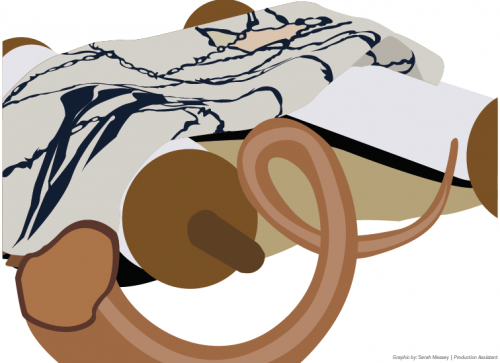
Yom Kippur, the Day of Atonement in the Jewish religion, begins at sundown on the tenth day of the first month of the Hebrew calendar and will conclude the following evening at sundown.
Ferris marketing sophomore Shaun Martin, from Orange County, New York, was raised Jewish.
“The Day of Atonement. Putting our wants aside and focusing more on the spiritual needs. Reconciling with ourselves, God and those around us,” Martin said. “It gives us a chance to acknowledge what we have done wrong and forgive others who have done wrong to us. It’s a day of cleansing ourselves in means of fasting and prayer.”
Yom Kippur is the holiest day in the entire Jewish religion. Yom Kippur occurs on the tenth day of Tishrei—the first month on the Hebrew calendar—and 10 days after the Hebrew New Year Rosh Hashanah.
The holiday Sukkot will take place on days 15-21 of Tishrei, which means The Feast of Booths. A traditional Yom Kippur for a Jewish person is as follows:
Observers enjoy a good dinner at sundown the night before Yom Kippur. Once the feast concludes, a 25-hour period of fasting will begin, which means no food or drinks. The next day, Jews make their way to the Synagogue for a day of intense prayer. The prayer service is separated into five different parts: Ma’ariv; Shacharit; Musaf; Mincha; and the closing prayer Ne’ilah. Jews do not go to work or use technology, and the more orthodox Jews will walk everywhere they need to go.
Once the sun goes down and all parts of the service are complete, friends and family come together for a great feast and break the fast.
Because Ferris State Jewish students are few, they struggle to continue following their religious traditions. They do not have many people around them to celebrate holidays with.
“I don’t practice my religion as much being at school. I haven’t been around people that do celebrate up here,” Martin said.
Ferris professor of history, Dr. Barry Mehler, who has been teaching at Ferris since 1989, said that the university does not do its part in spreading religious awareness and observing the largest religious holidays.
“On Rosh Hashanah, our New Year, the beginning of the holidays, all professors have to do is wish their students a Happy New Year, but they do not,” Mehler said.
Mehler created a Happy New Year ad for Rosh Hashanah that says, “L’Shana Tovah Bulldogs!” The ad made it into the Detroit Jewish News but was not posted anywhere on Ferris’ media outlets. There is no information for Yom Kippur on the Ferris website, only a posting on the calendar marking the date that the most important day for Jewish students does exist.
In Mehler’s 27 years at Ferris, he has noticed a trend for Jewish students on campus. Many of them are too afraid to openly tell other students they are Jewish due to the minimal education and bigotry of the religion.
“Jewish students are afraid to come out and say they’re Jewish. The environment can be a lot friendlier than that,” Mehler said.
Classes will be held as scheduled on Wednesday, Oct. 12, but Martin had this to say about his university not observing Yom Kippur:
“When I was in high school, my high school observed Jewish holidays and classes were not held. If we observe major holidays for other religions, why would we not observe the biggest Jewish holiday?”
